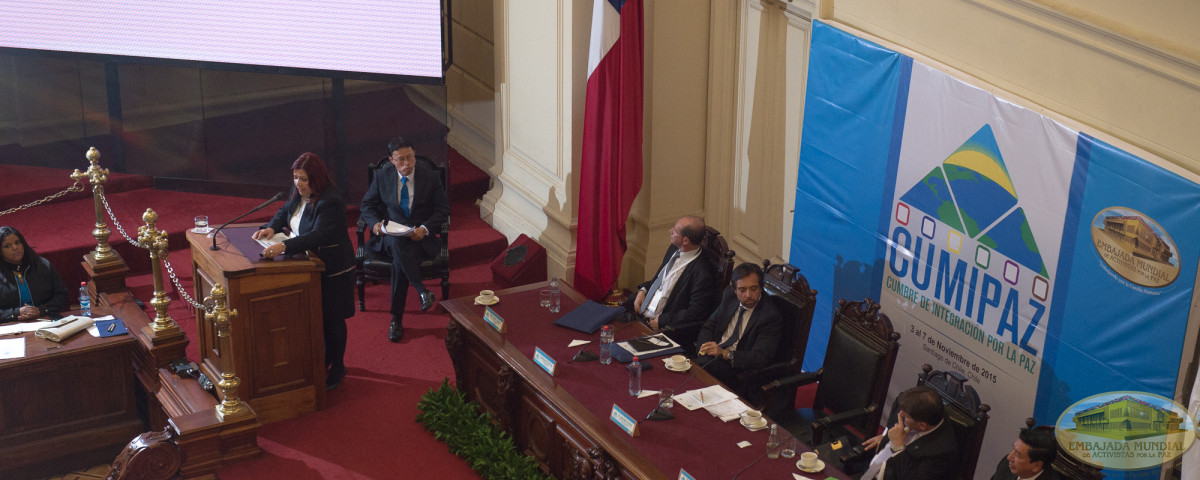Judicial Session: Analysis focused on the relationship of the UN and the International Criminal Court for a Justice for Peace
Authorities and personalities of important trajectory in the judicial field reaffirmed their commitment to promote justice for national and international peace, through proposals and analysis focused on the topic: "The UN and the International Criminal Court: harmonic interaction, independence or subordination? " through the third workshop during the Judicial Session of CUMIPAZ (Chile 2015).
Dr. William Soto, President of the GEAP, in his speech and in relation to this topic outlined the need to reconsider interaction between the United Nations, specifically, the UN Security Council and the International Criminal Court.
Members of the third table of the Judicial Session were: the Magistrate of the Superior Council of the Judiciary of Colombia, Dr. Pedro Alonso Sanabria; for Argentina, the President of the Court of Cassation of the nation, Dr. Ana Maria Figueroa.; Dr. Marcelo Franco Fiumara, Judge of the Criminal Court of the province of Buenos Aires and the Director of Immigration of the State, Dr. Martin Augusto Arias Duval.
 President of the First Criminal Appeals Chamber of the Superior Court of Justice, Dr. Percy Maximo Gomez Benavides, representing Peru, and representing Nicaragua, the Judge of the Central American Court of Justice, Dr. Ricardo Acevedo Peralta, also formed part of this table.
President of the First Criminal Appeals Chamber of the Superior Court of Justice, Dr. Percy Maximo Gomez Benavides, representing Peru, and representing Nicaragua, the Judge of the Central American Court of Justice, Dr. Ricardo Acevedo Peralta, also formed part of this table.
This last section generated important contributions for the elaboration of the conclusions of the Judicial Session, which will subsequently be considered to create a Declaration, which will be presented to various governments and agencies around the world.
Strengthening the International Criminal Court
"The independence, autonomy and efficiency of the ICC in a globalized world" was the first thematic axis developed by Judge Pedro Sanabria, who described the nature of the International Criminal Court (ICC), he stressed that it is the first permanent and independent court with the ability to investigate and bring justice to those who commit violations against international humanitarian law, war crimes, crimes against humanity, genocide and crimes of aggression.
However, he said that it should be reinforced in order to deal with these transgressions. “The court should be strengthened, it should adopt the necessary tools of empowerment and independence and thus combat the serious crimes of human rights violations that affect the entire planet".
Reflection of a justice for peace
On his behalf, Dr. Franco Fiumara developed the topic: "The reach of international instruments to prevent and punish genocide and other international crimes: Nazism and legality; justice from Nuremberg to the present.”
"Justice, is very necessary; if there is justice, there can be education, if there is justice, bonds of peace can be generated, if there is justice we can prevent, in relation to the future as a mirror image, logically, over sad events that have already happened, this can flow like a waterfall of peace.” Explained Dr. Fiumara.
Dr. Percy Gomez, made a call to reflect upon the actions of society for the preservation of human life: "What are we looking for? For the human species to not become extinct by blood and fire. That the human species be truly respected by ourselves." In addition, he asked those present for a minute of in memory of all those killed in different conflicts.
Identification and punishment of human rights violations
Dr. Ana Figueroa, in her role as President of the Court of Cassation, said that Argentina is one of the nine nations that conforms the Committees that fight against Genocide and which has also been recognized by the United Nations in punishing crimes against humanity.
In this regard, she spoke of the need "of adopting the provisions of internal law, in order to incorporate the rules of International Law of Human Rights, the obligation to identify and punish all those responsible for serious violations against Human Rights."
Public Policies for Migration
In this workshop, the central subject of "Latin American Cooperation: aspects and State policies for the flow of the integration of current migration” was also addressed by Dr. Martin Arias Duval, who heads the Migration Department of Argentina.
In his speech he noted that one of the problems that humanity has not solved is the issue of migration; and he mentioned that the reason, in most cases, is due to the lack of opportunities, uneven development among nations or the union of both issues.
"One of the issues to be addressed or should be addressed by States as public policy, is the migration issue, right? Just as a diplomatic policy, a policy of international relations of the States, a policy in the administration of justice, and an educational policy is established," said Dr. Arias.
Regulations addressed to human beings and their dignity
To close the table, Judge Ricardo Acevedo Peralta spoke of the "Community criminal competence of the Central American Court", in his lecture he stated that all the rules of Community Law are directed towards humans and their dignity. He also mentioned that the Central American integration system is not an end in itself, but an instrument for the pursuit of happiness, a better environment and the dignity of the human.
"Human rights is the transverse axis of the entire integration system," he stated.
The Global Embassy of Activists for Peace (GEAP) through CUMIPAZ 2015 organizes spaces for the integration of different nationalities, cultures and wills that converge on the need to promote respect for Human Rights in favor of a justice for peace.
